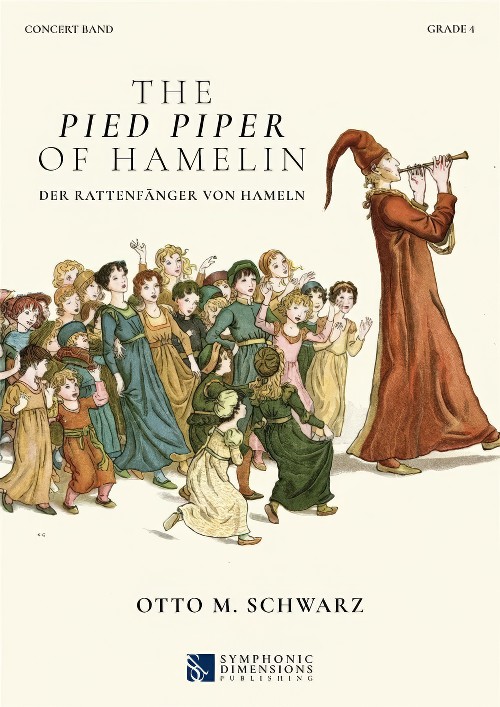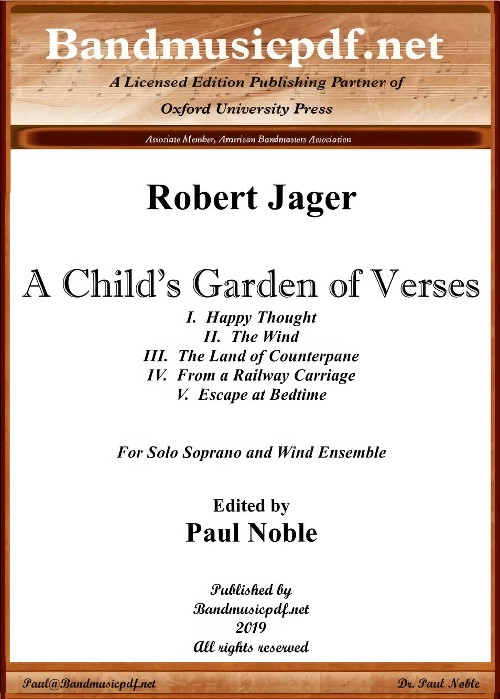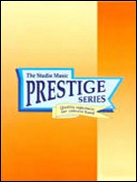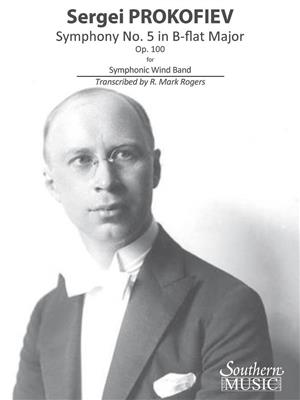Results
-
 £60.99
£60.99Caribbean Clarinets - Dagmar Kildevann
Whether you listen to 'Caribbean Clarinets', or you are a member of the orchestra, or you have perhaps even one of the solo parts in this composition, you will imagine yourself in a sun bathed paradise on earth. Dagmar Kildevann has given you a free trip to the Caribbean in this solo piece for the entire clarinet section. This is as cheap as it gets! You can feel the sun, taste the dishes and enjoy the wonderful music. The clarinets are put in the limelight and are given the opportunity to shine in a glorious 'Beguine' and an inviting 'Samba'. Parasol, lounge-chair, drink, being transported to another world by the music, in short : enjoy!
Estimated dispatch 7-14 working days
-
 £163.99
£163.99The Pied Piper of Hamelin (Concert Band - Score and Parts) - Schwarz, Otto M.
Stories, sagas and legends--who among us don't know them? Always delivered with a tinge of brutality, these cautionary tales are a legacy of moral education from times past: inquisitive children alone in the forest are generally eaten by a witch; the 'Soup-Kasper' of Hoffmann's Struwwelpeter dies from starvation rather than eating his soup; anyone letting in strangers usually gets devoured; anyone who plays with matches gets burned; and thumb-suckers get their thumbs cut off. The list of unfortunate demises is almost endless.In the tale of The Pied Piper of Hamelin, parents lose their children through greed, ridicule, scorn and a failure to appreciate art. There is still a street in the town of Hamelin in which neither drumming nor playing has not been allowed since 130 children disappeared into a mountain, never to be seen again. This composition by Otto M. Schwarz opens with exactly this scene, taking us back to the year 1284. As in many towns at the time, Hamelin in Germany suffered with hygiene problems--rats and mice began to multiply rapidly, and the town was overrun with the plague. There appeared a man dressed in colourful clothes who promised the locals to free them from this burden. They agreed and settled on a fee. Then the man pulled out a pipe and began to play. When the rats and mice heard this, they followed him. He led the animals into the Weser River, where they all drowned. Back in town, the people refused to pay him. They didn't recognise this man's skills and knowledge and were only prepared to pay for simple labour. A pact with the devil was made, which led to the Pied Piper leaving the town in a furious rage. One Sunday, when many people were at church, he returned, took out his flute and began to play. The town's children were so enchanted by his playing that they followed him. He led them out of the town and disappeared with them forever into a mountain forever. Of all the children, only two survived--however one was mute, and one was blind. In the street from which the children left Hamelin, music may no longer be played in memory of this event. The work may be performed in two different versions: 1. Purely instrumental (without narrator)--the GPs (pauses) must be kept short 2. With narrator--he speaks in the GPs but not during the music.Duration: 14.15
Estimated dispatch 7-14 working days
-
 £150.00
£150.00A Child's Garden of Verses (Soprano Solo with Concert Band - Score and Parts) - Jager, Robert - Noble, Paul
A Child's Garden of Verses has a very special meaning for me. Bob Jager, a family friend, was visiting in our home, and my wife, Mitzi Noble, a soprano soloist, was singing to his children. Bob's two young children became so enthralled with the music that Bob wanted to capture that moment. So he composed this piece for Mitzi, and dedicated it to his children, Kathleen and Matthew. The text is from Robert Louis Stevenson's poems: I. Happy Thought; II. The Wind; III. The Land of Counterpane; IV. From a Railway Carriage; V. Escape at Bedtime. Bob writes: The ideal performance instrumentation would be one on a part. If a larger group is used the balance should be kept proportional. In a few places the terms Solo or One are used where the sonority is critical, and this should be strictly followed. Above all, the singer should never feel forced by the ensemble. This work was composed in 1972, and was never published. I am pleased that Bob has allowed me now to publish it under Noble Music Publications, so that it may be available for others to perform and enjoy. Mitzi writes: Although we did not have access at the time, the ideal performance would be with a throat mic so that the soloist is free to move around the stage and sing, as though singing and relating to children sitting on the front row.
Estimated dispatch 7-14 working days
-
£59.99
Caribbean Clarinets Wind Band Set (Score & Parts)
Whether you listen to 'Caribbean Clarinets', or you are a member of the orchestra, or you have perhaps even one of the solo parts in this composition, you will imagine yourself in a sun bathed paradise on earth. Dagmar Kildevann has given you a free trip to the Caribbean in this solo piece for the entire clarinet section. This is as cheap as it gets! You can feel the sun, taste the dishes and enjoy the wonderful music. The clarinets are put in the limelight and are given the opportunity to shine in a glorious 'Beguine' and an inviting 'Samba'. Parasol, lounge-chair, drink, being transported to another world by the music, in short : enjoy! 03:30
Estimated dispatch 7-14 working days
-
 £21.95
£21.95SWISS FESTIVAL OVERTURE, A (Prestige Concert Band Extra Score) - Sparke, Philip
Extra Score. This light overture was written for a contest for both wind and brass bands held in Langenthal and funded by the Berne Music Association. It opens slowly and majestically and, after a climax, includes a section in free time for the trumpets and a cadenza for the euphonium. A lively, toe-tapping allegro follows with a central legato melody and a final flourish that recalls the opening fanfares. Performance time 9'37" (Recorded on QPRM115D GREAT BRITISH MUSIC FOR WIND BAND, Western Band of the Royal Air Force)
Estimated dispatch 7-14 working days
-
 £107.95
£107.95SWISS FESTIVAL OVERTURE, A (Prestige Concert Band Set) - Sparke, Philip
Score and Parts. This light overture was written for a contest for both wind and brass bands held in Langenthal and funded by the Berne Music Association. It opens slowly and majestically and, after a climax, includes a section in free time for the trumpets and a cadenza for the euphonium. A lively, toe-tapping allegro follows with a central legato melody and a final flourish that recalls the opening fanfares. Performance time 9'37" (Recorded on QPRM115D GREAT BRITISH MUSIC FOR WIND BAND, Western Band of the Royal Air Force)
Estimated dispatch 7-14 working days
-
 £57.50
£57.50Steps Ahead - Michael Gandolfi
Steps Ahead is a work by Michael Gandolfi that takes young players on a journey! Along the way, there are musical elements that are intended to educate the performers about basic compositional techniques that are intended to educate the performers about basic compositional techniques. Steps Ahead is a delightful piece with something interesting for every instrument in the ensemble. Each of its three sections addresses a kind of compositional technique - transposition, tutti (a 2-part homophonic section) and developing tutti (parts of the band enter to build to a 2-part homophonic tutti). Less experienced players might enjoy the challenges of easy syncopation and musical lines constructed with larger intervals. -Tom Duffy, series editor. BandQuest, an exciting series of new music and accompanying curricula for band, is a program published by the American Composers Forum. The series was started as a response to feedback from music educators that there is a pressing need for new, fresh band music. The heart of this program is new works written by a diverse group of leading American composers who have created challenging pieces that are a true departure from standard middle school repertoire. Visit www.bandquest.org to learn more about this innovative series, and email [email protected] request a free downloadable audio catalog.
Estimated dispatch 7-14 working days
-
 £356.00
£356.00Symphony No. 5 in B-flat Major, Op. 100 - Sergei Prokofiev
Written in a single summer month while World War II was still raging in 1944, Prokofiev's Symphony No. 5 would become not only one of the composer's most celebrated and performed works, it would stand among the giants in all of 20th Century classical compositions. Cast in four movements, Prokofiev once gave a statement that he intended it as a hymn to free and happy Man, to his mighty powers, his pure and noble spirit. He added, I cannot say that I deliberately chose this theme. It was born in me and clamoured for expression. The music matured within me. It filled my soul. Deliberate or not, his statement likely helped placate the Communist Soviet Party, who under Stalin ruthlessly, and often fatally, censored the art and music of the time. This Southern Music publication represents the first complete band transcription of Prokofiev's monumental work by one of the world's most respected wind band editors, Dr. R. Mark Rogers. The edition provides a rare opportunity in the symphonic wind band repertoire for ensembles to perform an orchestral masterpiece in its entirety.
Estimated dispatch 7-14 working days
-
£134.99
Recalls - Ben Haemhouts
Recalls obviously refers to memories. This piece of music is in fact a series of flashbacks, however, it does not highlight the actual memories of specific thoughts, people or events.The composition evolves around the late Frans Steurs, who for manyyears was the inspirational artist behind the brass band that is currently commissioning this work. The main theme of the work is based on the name STEURS". E = mi, U = do, R = re and S = "si" which is Dutch for the note "ti". This idea forms themusical theme for the entire composition and different variations are used throughout. The structure of the work is based on the concept of a story which father Steurs is telling his two daughters, who play the flute and the clarinet. Each part ofthe work has a story-like character:1. Introduction: following a short ominous intro, the main theme is presented for the first time.2. The Story: father Steurs has both his daughters on his knee and he tells them stories from the old days. Trumpetsand trombones play variations of the theme. The story gets very exciting (accelerande, poco a poco agitato) until the tale takes a dramatic turn when the father tells an exciting story at the time of the Second World War. He tells of being hunteddown by the occupying army and these adventurous episodes are related to us musically in part3. Danger, with its skilful references to "vor dem Sturm" from "Eine Alpensinfonie" by Richard Strauss.4. called Fugitives, is about how he fled in the nightfrom the enemy and this is reflected in the bass tones of a new theme. The aggression of the war is illustrated from bar 117 onwards, by a harsh brass section. The main theme is repeated once again and this time up-tempo. The second theme is broughtonce again from bar 149 onwards.5. Dialogues, depicts the conversations between the two daughters and their father. Father speaks (bar 155); the daughters answer (bar 164 - flute, bar 166 - clarinet); bar 178: father answers with the tune of the maintheme to the two daughters. The discussions gradually intensify but ultimately end in peace in the last part called Conclusion.The piece of music "Recalls" is a free interpretation by the composer who consulted the letters between the two daughtersof Steurs and their father and in this respect it is not really music for a programme."
Estimated dispatch 7-14 working days
-
 £79.99
£79.99Scalin' and Wailin' - Thomas C. Duffy
Scalin' and Wailin' is a flexible, fun piece written with a differentiated instruction model. Three different difficulty levels meet students where they're at in their development and allows space for each to grow. This piece is also ideal for educators and conductors looking for side by side programming - younger ensembles can all play within the easiest group and more advanced ensembles can play within the more difficult groups, all fitting together in one energetic piece. Celebrate BandQuest's 20th anniversary with this special release, and find what works for your ensemble! BandQuest, an exciting series of new music and accompanying curricula for band, is a program published by the American Composers Forum. The series was started as a response to feedback from music educators that there is a pressing need for new, fresh band music. The heart of this program is new works written by a diverse group of leading American composers who have created challenging pieces that are a true departure from standard middle school repertoire. Every BandQuest project includes a residency component in which the composer works collaboratively with a middle school as they create their new piece. Many BandQuest pieces are accompanied by an interdisciplinary curriculum designed to assist students as they learn the music and to integrate each piece with non-music studies. Visit www.bandquest.org to learn more about this innovative series, and email [email protected] to request a free downloadable audio catalog.
Estimated dispatch 7-14 working days
